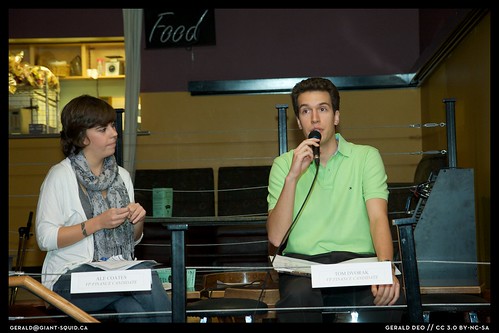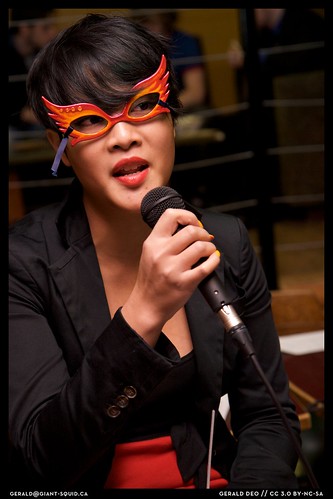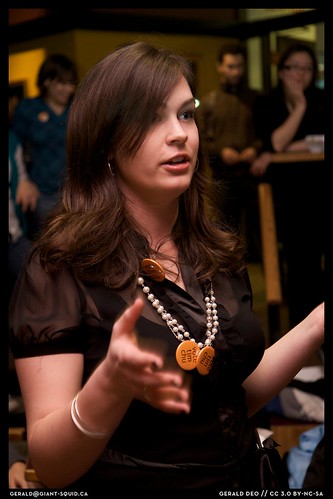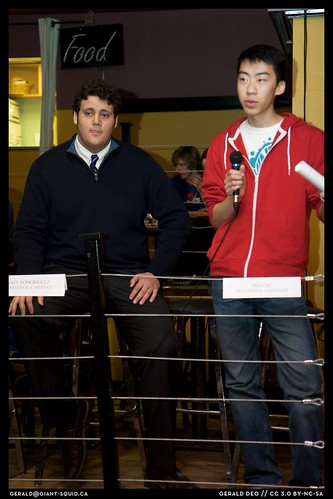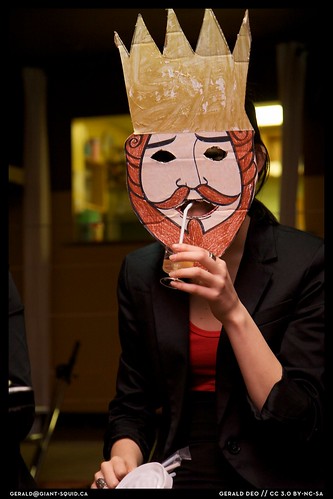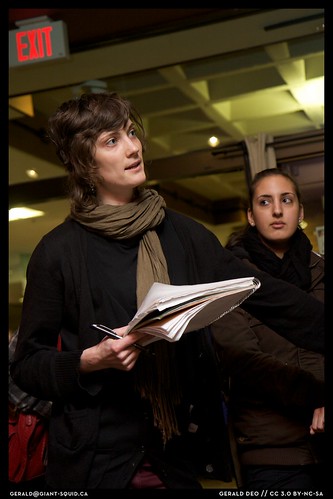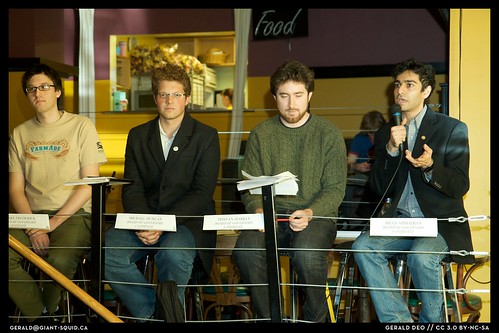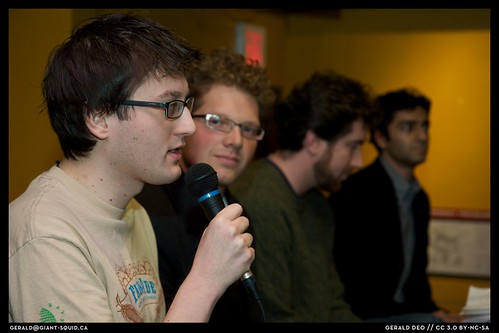I must admit that I spent a large part of the debates wondering why I was there, and then another part of them wondering “If I were Fire, what puns could I make about these debates?”. Things like “none of the candidates seemed to have spark”, or “candidates preferred flame wars over debates”, or “debates lacked sizzle”. Or something infinitely more witty. If only that was something the debates actually had- humour. Instead, I, along with many others, found the debates to be painfully dull.
I came in a tad late and thus missed the first part of the VP Finance debates, but not late enough to hear Tom advocate that student businesses at UBC need money to operate and to hear Ale say that she wants to improve club relations/promotions/partnerships by having a week-long fair that’s a major event to get clubs to work together. I wasn’t quite sure how this was different from clubs days (I know that others I was talking to also seemed confused on the point), except that it would take place in 2nd term, which I agree is a good idea- it would be great to have another club recruitment drive in January. Discussion then moved onto what to do with the ACF. Ale suggested that the AUS is capable of paying off its debt, but that if it couldn’t, then a repayment fund should be looked into and set up, while Tom said that the debt shouldn’t be put on the AUS and AMS should take the hit.
One thing that struck me as being interesting about Tom is that he is very committee-happy. While committees are often a wonderful thing, it seemed like his responses to a lot of things were to set up a committee to investigate the matter- in principle, a good thing, but I think that there’s enough information out there on some things (such as the child care problem) that this sort of thing isn’t really as necessary. The two candidates didn’t really differ much on the issue of child care at UBC, however- both agreed that it needs to be addressed, and that money needs to be put into the system to make it both more accessible and more affordable.
Discussion then turned to tuition fees, and, for the first time in my time at UBC, I heard a candidate say what I think all students know is going to happen- that tuition will continue to go up due to inflation, at the very least. Kudos to Tom for being realistic on the issue. His solution to the problem: instead of cutting things, we need to modify business practices to bring in more money. This was in contrast to Ale, who wants to decrease student fees, and who believes that the AMS needs to assess what fees need to be decreased and to retain businesses to increase AMS revenue and stabilize student fees this way. Which sounds like it’s contradictory (stabilizing student fees vs. decreasing them). So I’m not really sure what she meant, but can’t really conjecture.
In any case, other points brought up by both Tom and Ale:
In response to Ale’s question about the increasing the student reserve, Tom said that students need to be made aware of scholarships out there that go unclaimed every year, and that an increase in the student reserve does not need to happen.
In response to Tom’s question about her experience in business operations, Ale stated that she’s worked on SAC, but other than that failed to provide any more details about her previous leadership experience, and instead talked in vague terms about how she’d ensure that things would run well.
Ale wants to create a new used bookstore on campus, which will apparently go in the place of the copyright facilities, and which will make a profit- albeit a “smaller one”- simply by being around, because used bookstores have yet to lose money.
In general, my impressions of the two candidates were “meh”. There was lots of rhetoric, but I didn’t really get the sense that Tom had a good enough understanding of some issues, and I didn’t come away feeling like Ale really knew what she was getting into. But I was treated with some nice assertions. I think either candidate would do a fine job, but neither really struck me as being particularly outstanding based on the debates alone.
Moving on to the VP External debates… oh, where do I even start… how about with some advice.
1.) Don’t plant questions. It makes you look like you can’t stand up for yourself.
2.) Don’t bring cheerleaders. Voting isn’t based on how much noise the crowd makes, or by the amount of applause you get. Sadly, it doesn’t always seem to be based on how competent candidates are either. So maybe I’m just missing something. But seriously.
3.) Don’t bring provincial politics into this. You’re running for the AMS, and not for your political party- by bringing these issues into it, you a.) don’t look like you particularly care about UBC students and b.) look like you’re trying to launch a political career (which, granted, you might be, but at least try not to look so self-interested? Although it might help people see through you… so maybe scratch this point).
4.) Don’t insult people. Especially when those people might be working with you. I’ve written about this before. Telling Cody (I think it was Cody) that she was “Another member of AMS establishment who is continuing to disappoint students” was not cool, Ignacio. Particularly when you’re talking to an outreach worker.
5.) Learn what responsibilities your position encompasses. Things like equity, Ignacio, are a part of the position.
6.) Don’t pretend to be Obama. We’d all love it if he came to Canada. But you’re not Obama, as much as you’d like to be.
7.) Don’t talk about being invited to AMS meetings (Ignacio) when they’re open to students. And maybe, I don’t know, attend some.
I think that gives you a pretty good idea of what the debates were like. My notes make it seems significantly more exciting than it actually was. Some important issues were addressed, however. As much as I’m not a fan of Tim’s promises to lower tuition fees, he seems to mostly be running on issues of equity and representations of minority groups, which I quite support, even if he doesn’t seem to have a concrete plan on how to do this. Ignacio, on the other hand, seemed to think that knowing nothing about how the AMS worked was a point in his favour, and emphasized instead how important “new blood” was to the AMS, and how he has fresh ideas (none of which I heard, by the way, but maybe his platform has more details?) while doing nothing but offering rhetoric and repeating the phrases “I have a plan”, “___ is broken”, and “I am running for Change”. Sadly, his points fell short of his rhetoric.
All in all, attending these debates didn’t really do anything for me other than make me contemplate the sad state of the elections and understand why most students don’t vote.
